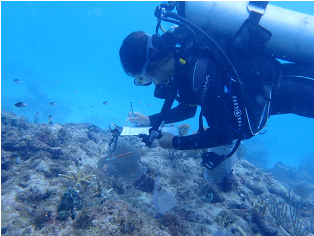NCCOS-supported researchers from the University of Florida and Smithsonian Marine Station paired water quality sensors with coral outplants to develop data-driven criteria for selection of restoration sites in the Florida Keys National Marine Sanctuary, home to the world’s third largest barrier reef.
In partnership with the Coral Restoration and Coral Reef Monitoring and Assessment Programs at Mote Marine Laboratory, the project investigated how water quality could be used to identify optimal coral restoration sites. An array of candidate restoration sites from nearshore patch reefs to offshore fore reefs were out-planted with hundreds of threatened staghorn coral (Acropora cervicornis) and water quality sensors. The sensors measured factors known to stress corals including temperature, pH, and salinity, as well as, dissolved oxygen.

These trials revealed that corals at the inshore sites fared worst, with high rates of bleaching and mortality, and that these sites experienced the highest temperatures and lowest dissolved oxygen. Although staghorn coral previously existed within some nearshore sites, these results have reinforced the decision to focus out-planting of branching corals to mid-channel and offshore reefs in the Florida Keys, where those coral are expected to have lower bleaching rates and higher survivorship than nearshore reefs.
While restoration efforts have long recognized that water quality in general is an important consideration, the project is working to identify which factors are specifically limiting coral success (i.e., dissolved oxygen, temperature, and pH). The next steps will involve laboratory trials to better understand how high temperature and low oxygen affect corals independently and together, and expansion of the project to other coral species that may be more stress tolerant.
The goal is to support the success of the unprecedented coral restoration effort happening throughout Florida’s Coral Reef, including NOAA’s Mission: Iconic Reefs program.
